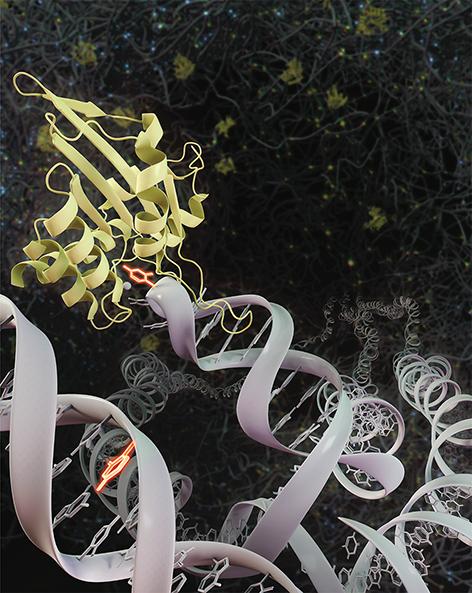Monitoring RNA hotspots reveals target in cancer tumor cells

Credit: UCI School of Medicine
Irvine, CA – June 12, 2020 – A new University of California, Irvine-led study reveals a protein responsible for genetic changes resulting in a variety of cancers, may also be the key to more effective, targeted cancer therapy.
The study, published today in Nature Communications, titled, “Quantification of ongoing APOBEC3A activity in tumor cells by monitoring RNA editing at hotspots,” reveals how the genomic instability induced by the protein APOBEC3A offers a previously unknown vulnerability in cancer cells.
Each day, in human cells, tens of thousands of DNA damage events occur. In cancer cells, the expression of the protein APOBEC3A is one of the most common sources of DNA damage and mutations. While the mutations caused by these particular proteins in cancer cells contribute to tumor evolution, they also cause breaks in the DNA, which offer a vulnerability.
“Targeting cancer cells with high levels of APOBEC3A protein activities and disrupting, at the same time, the DNA damage response necessary to repair damages caused by APOBEC3A, could be key to more effective cancer therapies,” said Remi Buisson, PhD, senior investigator and an assistant professor in the Department of Biological Chemistry at the UCI School of Medicine. “However, to exploit the vulnerability of the cancer cells, it is critical to first quantitatively measure the protein’s activity in tumors.”
To understand the role of APOBEC3A in tumor evolution and to target the APOBEC3A -induced vulnerabilities, the researchers developed an assay to measure the RNA-editing activity of APOBEC3A in cancer cells. Because APOBEC3A is difficult to quantify in tumors, developing a highly sensitive assay for measuring activity was critical. Using hotspot RNA mutations, identified from APOBEC3A-positive tumors, the team developed an assay using droplet digital PCR and demonstrated its applicability to clinical samples from cancer patients.
“Our study presents a new strategy to follow the dysregulation of APOBEC3A in tumors, providing opportunities to investigate the role of APOBEC3A in tumor evolution and to target the APOBEC3A-induced vulnerability in therapy,” said Buisson. “We anticipate that the RNA mutation-based APOBEC3A assay will significantly advance our understanding of the function of the protein in tumorigenesis and allow us to more effectively exploit the vulnerabilities it creates in cancer therapy.”
###
This study was funded in part by the National Institutes of Health, a California Breast Cancer Research Program grant and an MPN Research Foundation Challenge grant.
About the UCI School of Medicine
Each year, the UCI School of Medicine educates more than 400 medical students, and nearly 150 doctoral and master’s students. More than 700 residents and fellows are trained at UCI Medical Center and affiliated institutions. The School of Medicine offers an MD; a dual MD/PhD medical scientist training program; and PhDs and master’s degrees in anatomy and neurobiology, biomedical sciences, genetic counseling, epidemiology, environmental health sciences, pathology, pharmacology, physiology and biophysics, and translational sciences. Medical students also may pursue an MD/MBA, an MD/master’s in public health, or an MD/master’s degree through one of three mission-based programs: the Health Education to Advance Leaders in Integrative Medicine (HEAL-IM), the Leadership Education to Advance Diversity-African, Black and Caribbean (LEAD-ABC), and the Program in Medical Education for the Latino Community (PRIME-LC). The UCI School of Medicine is accredited by the Liaison Committee on Medical Accreditation and ranks among the top 50 nationwide for research. For more information, visit som.uci.edu.
Media Contact
Anne Warde
[email protected]
Original Source
http://som.
Related Journal Article
http://dx.




